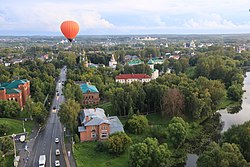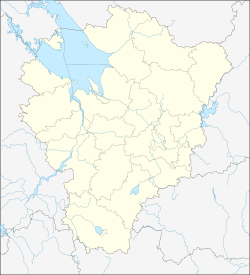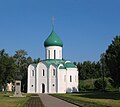Pereslavl-Zalessky
Pereslavl-Zalessky
Переславль-Залесский | |
|---|---|
 Pereslavl-Zalessky | |
| Coordinates: 56°44′N 38°51′E / 56.733°N 38.850°E | |
| Country | Russia |
| Federal subject | Yaroslavl Oblast[1] |
| Founded | 1152 |
| Government | |
| • Body | Town Duma |
| • Mayor | Dmitry Zyablitsky |
| Area | |
• Total | 23.01 km2 (8.88 sq mi) |
| Elevation | 142 m (466 ft) |
| Population | |
• Total | 41,925 |
• Estimate (2018)[4] | 38,649 (−7.8%) |
| • Subordinated to | town of oblast significance of Pereslavl-Zalessky[1] |
| • Capital of | Pereslavsky District,[1] town of oblast significance of Pereslavl-Zalessky[1] |
| • Urban okrug | Pereslavl-Zalessky Urban Okrug[5] |
| • Capital of | Pereslavl-Zalessky Urban Okrug,[5] Pereslavsky Municipal District |
| Time zone | UTC+3 (MSK |
| Postal code(s)[7] | 152020, 152021, 152023–152026 |
| Dialing code(s) | +7 48535 |
| OKTMO ID | 78705000001 |
| Website | www |
Pereslavl-Zalessky (Russian: Переславль-Залесский, IPA: [pʲɪrʲɪˈslavlʲ zɐˈlʲeskʲɪj]), formerly known as Pereyaslavl-Zalessky,[8][9] is a town in Yaroslavl Oblast, Russia, located on the main Moscow–Yaroslavl road and on the southeastern shore of Lake Pleshcheyevo at the mouth of the Trubezh River. Population: 41,925 (2010 Census);[3] 43,379 (2002 Census);[10] 42,331 (1989 Soviet census).[11]
History
[edit]It was founded in 1152 by George I of Vladimir as a projected capital of Zalesye (lit. 'beyond the woods').[12] The inhabitants of the nearby town of Kleshchin were relocated to the new town.
Between 1175 and 1302, Pereslavl was the seat of a principality; in 1302, it was inherited by the prince of Moscow following the childless death of Dmitry of Pereslavl's son Ivan.[13] Pereslavl-Zalessky was devastated numerous times by the Mongols between the mid-13th century and the early 15th century. In 1611–1612, it suffered from the Polish invasion.[14]
In 1688–1693, Peter the Great built his famous "fun flotilla" on Lake Pleshcheyevo for his own amusement, including the so-called Peter's little boat (botik), which could be considered the forerunner of the Russian fleet. The Central Naval Museum, which chronicles the history of the Russian fleet, currently houses this scale model boat.
In 1708, the town became a part of Moscow Governorate.[15]
Geography
[edit]Pereslavl-Zalessky is located in southern Yaroslavl Oblast, near the border with Moscow Oblast, 140 kilometres (87 mi) northeast of Moscow, and 123 kilometres (76 mi) southwest of Yaroslavl.
Climate
[edit]Climate of Pereslavl-Zalessky is humid continental: long, cold and snowy winters and short, warm and rainy summers. Average temperatures range from −12 °C (10 °F) in January to +18 °C (64 °F) in July.
| Climate data for Pereslavl-Zalessky (extremes 1921-present) | |||||||||||||
|---|---|---|---|---|---|---|---|---|---|---|---|---|---|
| Month | Jan | Feb | Mar | Apr | May | Jun | Jul | Aug | Sep | Oct | Nov | Dec | Year |
| Record high °C (°F) | 7.1 (44.8) |
7.7 (45.9) |
19.6 (67.3) |
25.8 (78.4) |
32.8 (91.0) |
34.8 (94.6) |
35.7 (96.3) |
35.2 (95.4) |
30.1 (86.2) |
25.1 (77.2) |
14.3 (57.7) |
8.5 (47.3) |
35.7 (96.3) |
| Mean daily maximum °C (°F) | −5.2 (22.6) |
−4.1 (24.6) |
1.9 (35.4) |
10.7 (51.3) |
18.4 (65.1) |
21.6 (70.9) |
24.0 (75.2) |
21.8 (71.2) |
15.7 (60.3) |
8.0 (46.4) |
0.5 (32.9) |
−3.6 (25.5) |
9.1 (48.4) |
| Daily mean °C (°F) | −7.9 (17.8) |
−7.5 (18.5) |
−2.3 (27.9) |
5.5 (41.9) |
12.4 (54.3) |
16.1 (61.0) |
18.5 (65.3) |
16.4 (61.5) |
11.1 (52.0) |
4.9 (40.8) |
−1.7 (28.9) |
−5.8 (21.6) |
5.0 (41.0) |
| Mean daily minimum °C (°F) | −10.7 (12.7) |
−10.5 (13.1) |
−5.7 (21.7) |
1.0 (33.8) |
7.3 (45.1) |
11.2 (52.2) |
13.6 (56.5) |
11.8 (53.2) |
7.5 (45.5) |
2.5 (36.5) |
−3.7 (25.3) |
−8.1 (17.4) |
1.4 (34.4) |
| Record low °C (°F) | −38.2 (−36.8) |
−35.6 (−32.1) |
−29.0 (−20.2) |
−19.4 (−2.9) |
−5.5 (22.1) |
−0.6 (30.9) |
4.5 (40.1) |
0.8 (33.4) |
−6.8 (19.8) |
−16.4 (2.5) |
−26.6 (−15.9) |
−43.7 (−46.7) |
−43.7 (−46.7) |
| Average precipitation mm (inches) | 44.9 (1.77) |
33.8 (1.33) |
31.8 (1.25) |
33.6 (1.32) |
51.4 (2.02) |
76.7 (3.02) |
75.8 (2.98) |
65.4 (2.57) |
58.6 (2.31) |
64.2 (2.53) |
47.5 (1.87) |
44.3 (1.74) |
628 (24.71) |
| Source: pogoda.ru.net[16] | |||||||||||||
Administrative and municipal status
[edit]Within the framework of administrative divisions, Pereslavl-Zalessky serves as the administrative center of Pereslavsky District, even though it is not a part of it.[1] As an administrative division, it is incorporated separately as the town of oblast significance of Pereslavl-Zalessky—an administrative unit with the status equal to that of the districts.[1] As a municipal division, the town of oblast significance of Pereslavl-Zalessky is incorporated as Pereslavl-Zalessky Urban Okrug.[5]
Science and education
[edit]The Program Systems Institute of the Russian Academy of Sciences is based in the town. A small, non-state university closely linked to the institute, the University of Pereslavl, existed between 1992 and 2017, when it went bankrupt and was liquidated.
Sights and architecture
[edit]The town is a part of the Golden Ring of Russia. Monuments of church architecture include six architecture complex convents and nine churches. Notable historic buildings are:
- white stone Savior's Cathedral (1152–1157)
- Church of Metropolitan Peter (1585)
- Troitse-Danilov Monastery (16th–18th centuries)
- Nikitsky Monastery (16th–19th centuries)
- Feodorovsky Monastery (16th–19th centuries)
- Goritsky Monastery (17th–18th centuries)
-
Sovetskaya Street
-
St. Nicholas Monastery was built in the XIVth century
-
Savior's Cathedral (1152–1157)
-
Aeronautics festival over Nikitsky Monastery
- Museum and exhibits

- Museum-Preserve of Pereslavl-Zalessky (in Goritsky Monastery)
- Museum–Estate "The Little Boat of Peter the Great"
- The Pereslavl Arboretum
- Museum of Flat Irons
- The Museum of Kettles
- The Museum of Steam Engines
The Kleshchin complex, an archaeological monument, is located about 2 kilometers (1.2 mi) from the town proper. The original earthworks (which are still quite substantial) from the defensive wall that circled the town originally are still here, it is possible to walk along these defensive structures. As are portions if the original road that was at its base.
The town sits on the banks of Lake Pleschayevo, a large lake that draws tourists throughout the season. Kite surfing is particularly popular, as is camping.
Notable people
[edit]
- Nicetas Stylites, (??-1186) a 12th-century Russian saint who founded the Monastery of St. Nicetas
- Alexander Nevsky, (1221–1263) prince and saint.[17]
- Pavel Kolendas, (1820-??) Russian portrait painter
- Dmitry Mirimanoff (1861–1945) mathematician, contributed to axiomatic set theory
- Dmitry Kardovsky, (1866–1943) an artist, illustrator and stage designer.
- Leonid Kurchevsky, (1890–1937 or 1939) a Russian/Soviet weapons designer.
- Mikhail Koshkin, (1898–1940) designed the T-34 tank
- Alexander Petrov, (born 1987) actor
References
[edit]Notes
[edit]- ^ a b c d e f g Law #12-z
- ^ Территориальный орган Федеральной службы государственной статистики по Ярославской области. Ярославская область в цифрах 2012. Краткий статистический сборник Archived May 17, 2017, at the Wayback Machine (in Russian)
- ^ a b Russian Federal State Statistics Service (2011). Всероссийская перепись населения 2010 года. Том 1 [2010 All-Russian Population Census, vol. 1]. Всероссийская перепись населения 2010 года [2010 All-Russia Population Census] (in Russian). Federal State Statistics Service.
- ^ "26. Численность постоянного населения Российской Федерации по муниципальным образованиям на 1 января 2018 года". Federal State Statistics Service. Retrieved January 23, 2019.
- ^ a b c Law #65-z
- ^ "Об исчислении времени". Официальный интернет-портал правовой информации (in Russian). June 3, 2011. Retrieved January 19, 2019.
- ^ Почта России. Информационно-вычислительный центр ОАСУ РПО. (Russian Post). Поиск объектов почтовой связи (Postal Objects Search) (in Russian)
- ^ Felecan, Oliviu; Bugheșiu, Alina (August 19, 2021). Names and Naming: Multicultural Aspects. Springer Nature. p. 411. ISBN 978-3-030-73186-1.
- ^ Nossov, Konstantin S. (June 20, 2012). Medieval Russian Fortresses AD 862–1480. Bloomsbury Publishing. p. 57. ISBN 978-1-84908-060-6.
- ^ Federal State Statistics Service (May 21, 2004). Численность населения России, субъектов Российской Федерации в составе федеральных округов, районов, городских поселений, сельских населённых пунктов – районных центров и сельских населённых пунктов с населением 3 тысячи и более человек [Population of Russia, Its Federal Districts, Federal Subjects, Districts, Urban Localities, Rural Localities—Administrative Centers, and Rural Localities with Population of Over 3,000] (XLS). Всероссийская перепись населения 2002 года [All-Russia Population Census of 2002] (in Russian).
- ^ Всесоюзная перепись населения 1989 г. Численность наличного населения союзных и автономных республик, автономных областей и округов, краёв, областей, районов, городских поселений и сёл-райцентров [All Union Population Census of 1989: Present Population of Union and Autonomous Republics, Autonomous Oblasts and Okrugs, Krais, Oblasts, Districts, Urban Settlements, and Villages Serving as District Administrative Centers]. Всесоюзная перепись населения 1989 года [All-Union Population Census of 1989] (in Russian). Институт демографии Национального исследовательского университета: Высшая школа экономики [Institute of Demography at the National Research University: Higher School of Economics]. 1989 – via Demoscope Weekly.
- ^ Ver Berkmoes, Ryan (2000). Russia, Ukraine & Belarus (2nd ed.). Melbourne: Lonely Planet. p. 271. ISBN 9780864427137.
- ^ Auty, Robert; Obolensky, Dimitri (1976). Companion to Russian Studies: Volume 1: An Introduction to Russian History. Cambridge University Press. p. 83. ISBN 978-0-521-28038-9.
- ^ Brumfield, W. (August 9, 2019). "The extraordinary revival of the Convent of St. Theodore in Pereslavl-Zalessky". Russia Beyond the Headlines. Retrieved January 29, 2020.
- ^ Указ об учреждении губерний и о росписании к ним городов (in Russian)
- ^ "Климат Переславля-Залесского" (in Russian). Retrieved December 29, 2022.
- ^ Bain, Robert Nisbet (1911). . Encyclopædia Britannica. Vol. 1 (11th ed.). p. 556.
Sources
[edit]- Государственная Дума Ярославской области. Закон №12-з от 7 февраля 2002 г «Об административно-территориальном устройстве Ярославской области и порядке его изменения», в ред. Закона №67-з от 21 декабря 2012 г. «О внесении изменений в отдельные законодательные акты Ярославской области и признании утратившими силу отдельных законодательных актов (положений законодательных актов) Ярославской области». Вступил в силу через шесть месяцев со дня официального опубликования. Опубликован: "Губернские вести", №11, 15 февраля 2002 г. (State Duma of Yaroslavl Oblast. Law #12-z of February 7, 2002 On the Administrative-Territorial Structure of Yaroslavl Oblast and on the Procedures of Its Change, as amended by the Law #67-z of December 21, 2012 On Amending Various Legislative Acts of Yaroslavl Oblast and on Abrogation of Various Legislative Acts (Clauses of Legislative Acts) of Yaroslavl Oblast. Effective as of the day six months from the day of the official publication.).
- Государственная Дума Ярославской области. Закон №65-з от 21 декабря 2004 г. «О наименованиях, границах и статусе муниципальных образований Ярославской области», в ред. Закона №59-з от 28 декабря 2011 г «Об изменении статуса рабочего посёлка Песочное Рыбинского района и о внесении изменений в отдельные законодательные акты Ярославской области». Вступил в силу через 10 дней со дня официального опубликования. Опубликован: "Губернские вести", №70, 23 декабря 2004 г. (State Duma of Yaroslavl Oblast. Law #65-z of December 21, 2004 On the Names, Borders, and Status of the Municipal Formations of Yaroslavl Oblast, as amended by the Law #59-z of December 28, 2011 On Changing the Status of the Work Settlement of Pesochnoye of Rybinsky District and on Amending Various Legislative Acts of Yaroslavl Oblast. Effective as of after 10 days from the day of the official publication.).
Further reading
[edit]- (in Russian) Pereslavl-Zalessky. Materials for the History of the 17th and 18th centuries (1884) (Переславль-Залесский. Материалы для истории города XVII и XVIII столетий) at Runivers.ru in DjVu and PDF formats
External links
[edit] Media related to Pereslavl-Zalessky at Wikimedia Commons
Media related to Pereslavl-Zalessky at Wikimedia Commons- Official website (in Russian)
- Audio guide to Pereslavl-Zalessky tourismpereslavl.ru
- Guide to Pereslavl
- Peter the Great's small boats (PDF)
- Railway museum at Pereslavl-Zalessky (narrow gauge)
- Lakeside idylls at Pereslavl-Zalessky Archived July 11, 2012, at the Wayback Machine
- Guide to Golden Ring of Russia (in Russian)
- Guide to Pereslavl-Zalessky (in Russian)









